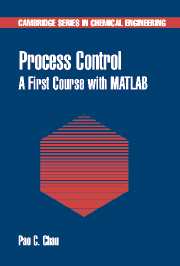Book contents
- Frontmatter
- Contents
- Preface
- 1 Introduction
- 2 Mathematical Preliminaries
- 3 Dynamic Response
- 4 State-Space Representation
- 5 Analysis of Single-Loop Control Systems
- 6 Design and Tuning of Single-Loop Control Systems
- 7 Stability of Closed-Loop Systems
- 8 Frequency-Response Analysis
- 9 Design of State-Space Systems
- 10 Multiloop Systems
- MATLAB Tutorial Sessions
- Homework Problems
- References
- Index
10 - Multiloop Systems
Published online by Cambridge University Press: 05 June 2012
- Frontmatter
- Contents
- Preface
- 1 Introduction
- 2 Mathematical Preliminaries
- 3 Dynamic Response
- 4 State-Space Representation
- 5 Analysis of Single-Loop Control Systems
- 6 Design and Tuning of Single-Loop Control Systems
- 7 Stability of Closed-Loop Systems
- 8 Frequency-Response Analysis
- 9 Design of State-Space Systems
- 10 Multiloop Systems
- MATLAB Tutorial Sessions
- Homework Problems
- References
- Index
Summary
There are many advanced strategies in classical control systems. Only a limited selection of examples is presented in this chapter. We start with cascade control, which is a simple introduction to a multiloop, but essentially SISO, system. We continue with feedforward and ratio control. The idea behind ratio control is simple, and it applies quite well to the furnace problem that is used as an illustration. Finally, a multiple-input multiple-output (MIMO) system is addressed with a simple blending problem as illustration, and the problem is used to look into issues of interaction and decoupling. These techniques build on what we have learned in classical control theories.
What Are We Up to?
Applying classical controller analysis to cascade control, feedforward control, feedforward–feedback control, ratio control, and the Smith predictor for time-delay compensation
Analyzing a MIMO system with relative gain array and assessing the pairing of manipulated and controlled variables
Attempting to decouple and eliminate the interactions in a two-input two-output system
Cascade Control
A common design found in process engineering is cascade control. This is a strategy that allows us to handle load changes more effectively with respect to the manipulated variable.
To illustrate the idea, we consider the temperature control of a gas furnace, which is used to heat up a cold process stream. The fuel-gas flow rate is the manipulated variable, and its flow is subject to fluctuations that are due to upstream pressure variations.
Information
- Type
- Chapter
- Information
- Process ControlA First Course with MATLAB, pp. 198 - 225Publisher: Cambridge University PressPrint publication year: 2002
